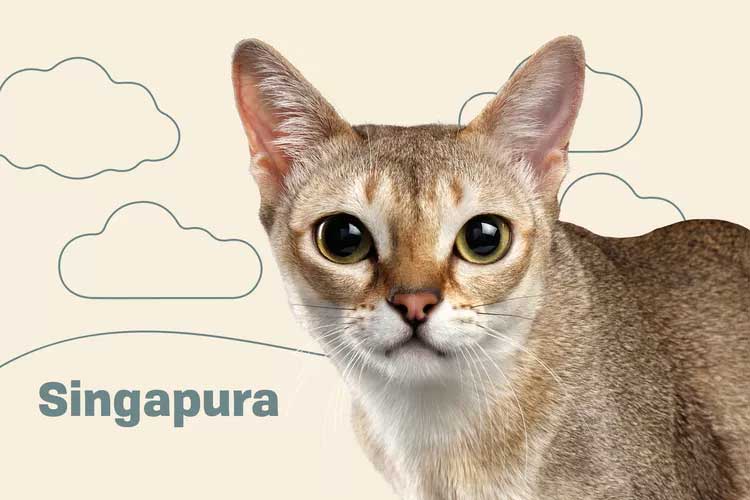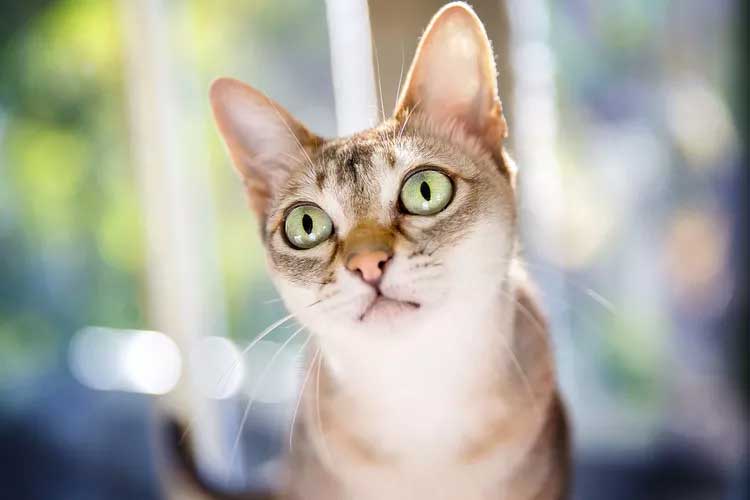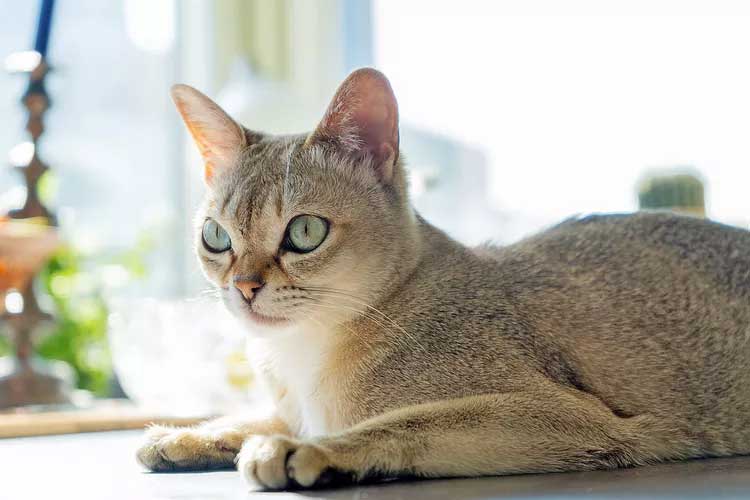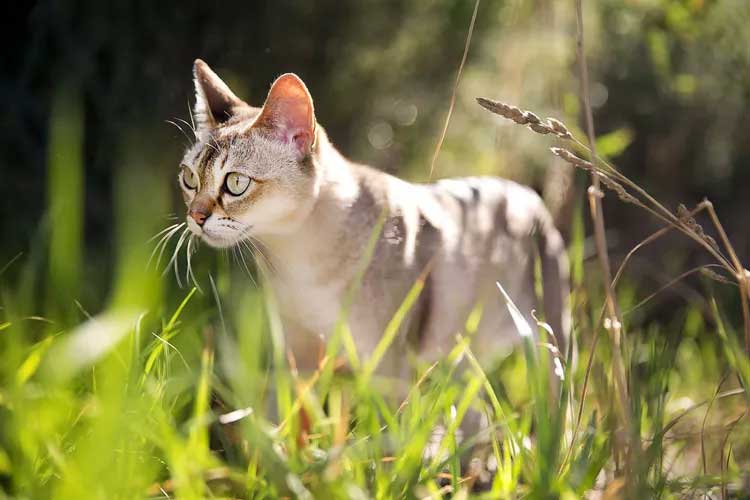Singapura cats are high-energy, pint-sized pets with wide eyes, big ears, and playful personalities. Learn more about living with Singapuras.

Singapura Overview
| OFFICIAL NAME | Singapura |
| COMMON NAME | Singapura |
| PET HEIGHT | 6 to 8 inches |
| PET WEIGHT | 4 to 8 pounds |
| LIFESPAN | 9 to 15 years |
| GOOD WITH | cats, children, families, seniors |
| TEMPERAMENT | affectionate, bold, neurotic, shy, sociable |
| INTELLIGENCE | high |
| SHEDDING AMOUNT | infrequent |
| PLAYFULNESS | high |
| ENERGY LEVEL | hyper |
| VOCAL LEVEL | howler |
| COAT LENGTH | short |
| COLORS | chocolate / brown / sable, cream / beige / tan |
| PATTERNS | tabby |
| OTHER TRAITS | easy to groom, easy to train, friendly toward humans, friendly toward other pets, good for first-time pet owners, tolerates being picked up |
The Singapura (pronounced "sing-uh-poor-uh") is the smallest breed of domesticated cats. However, these petite pets are known for packing a lot of personality into their tiny bodies. Singapuras are pretty much guaranteed to steal the show wherever they go.
This playful breed thrives on attention—and they get quite a bit, thanks to their unusual appearance and playful temperament. Singapuras have saucer-shaped eyes, large ears, tiny frames, and the energy of a few larger cats combined. These small, strong cats make fun family members and close companions.
Singapuras are relatively rare, and a Singapura kitten from a breeder can cost between $800–$2,000, depending on pedigree.
Appearance
This breed is known for being especially small, seeming micro-sized in comparison to common house cats. It takes these pets up to two years to reach their full size, and even adult cats only end up weighing between 4–8 pounds. Singapuras' size isn't their only defining trait, though—these eye-catching felines have big ears and large, round eyes that can be hazel, green, or yellow.
Singapuras' coats come in one color, called sepia agouti. "Sepia agouti" is essentially a fancy name for a ticked tabby pattern, with dark brown spots over light, cream-colored fur. These cats have short silky hair, darkly tipped blunt tails, and are lighter near their chests, stomachs, and muzzles.
Singapuras' short coats don't shed in excess—or much at all—but they're not considered to be "hypoallergenic" cats (and there's really no such thing). Their skin has quite a bit of dander, which irritates owners with allergies. Although their short coats don't help prevent allergens, they are considerably easier to care for than many other breeds.
Temperament
These curious cats are engaging extroverts who love to be the center of attention. Singapuras thrive on the attention of humans, and they're not afraid to demand the spotlight. Their personalities are high-energy, assertive, intelligent, and playful.Singapuras are kittenish in more than just their size. Even after they've matured to adulthood at around 2 years of age, this breed stays as active, silly, and needy as a typical kitten. Singapuras are also incredibly chatty and love to meow, often for no real reason at all.
Thankfully, their soft, sweet voices keep this breed's incessant meowing relatively pleasant.
Living Needs
The Singapura is an interactive, intelligent breed who desires connection and affection above all. Make no mistake—these cats will want to be in your face (and give headbutts) almost constantly. Singapuras love to live life with their pet parents and will try to involve themselves in day-to-day activities like making dinner or typing emails.
Singapuras will often insist on your attention. Though this curious, inquisitive breed might seem bossy and demanding, they are truly loving friends. Some owners say their Singapuras can even sense when they're upset and try to console them.
Don't let the cats' near-constant desire to be close fool you, however. These felines do like to flex their independence, mostly when they're trying to avoid tasks they would rather not partake in, like grooming. They also tend not to stay in one place too long and might wander off when you're finally ready to sit down and cuddle them.
"While a great pet for the active family, this breed does not like loud noises," says Natalie L. Marks, DVM, CVJ and Royal Canin veterinarian partner. "It would not be a great placement for families living in loud urban neighborhoods, with multiple small children, or dog breeds that are very vocal."
Singapuras love to leap to high places, scale cabinets, and even ride around their humans' shoulders. These little sidekicks are gentle and playful and will appreciate toys that challenge them mentally and physically. Tall cat trees and puzzle toys that reward with treats are great gifts for Singapuras.
This breed doesn't tolerate being left alone for long. They won't be destructive, but their moods can be affected by the loneliness and lack of interaction. Additionally, though they're social with their families, Singapuras can be very cautious when it comes to meeting new people.
Care
Singapuras shed lightly and require very little grooming. Brushing them once every one to two weeks, regularly trimming their nails, and occasionally cleaning their ears is the extent of Singapuras' needs. Bathing should be infrequent—these pets do a great job of keeping themselves clean.Singapura cats are incredibly active and won't need a ton of motivation to get moving. Provide cat trees for climbing, interactive cat toys, and opportunities for one-on-one play.
"Because they are curious, highly intelligent, and love to climb, they tend to create their own exercise, but do also enjoy interactive exercise with the family," Marks says.

These intelligent animals love to learn. Beyond the basics of litter box and scratching post training, you can work in some tricks for your Singapura. This breed loves a challenge (physically and mentally) and responds well to clicker training.
Because Singapuras are so small, they can be a bit timid. Early and gentle introductions to people and other pets are the best way to approach socialization with these cats. Give them treats during or after successful social interactions to reward them for their patience.
Health
Singapuras have a lifespan of 9–15 years and are generally healthy animals. However, "Singapuras can be born with a genetic disease called pyruvate kinase deficiency, which causes anemia and other blood-related problems," Marks says. "Unfortunately, the only treatment for this disease is a bone marrow transplant."Other common health risks for Singapuras include renal failure, hypothyroidism, and diabetes. Due to their small size and a condition known as uterine inertia, Singapuras often require cesarean sections to deliver their kittens.
"This breed is one that lacks a lot of genetic diversity, which means it's very important to screen for a reputable breeder carefully when adopting a kitten," Marks says.
Taking your cat to regular veterinary appointments will keep him healthy. Your Singapura should also be fed a diet of high-quality cat food recommended by your veterinarian.
History
The history of the Singapura remains a bit controversial. The original story, according to The Progressive Singapura Cat Club, is that two American breeders, Hal and Tommy Meadows, claimed to have found three kittens of this breed roaming the streets of Singapore. They brought them back to the U.S., where they continued breeding them.
Singapore decided to embrace the Singapura as a mascot, cementing the breed as a beloved cultural symbol. Breed registration organizations also largely recognize Singapura as a natural breed, though some believe the cats were bred intentionally for their size and looks.
Fun Facts
Singapura is the Malaysian word for "Singapore," or "Lion City," where the cat is purported to have originated.The average Singapura litter consists of only two or three kittens, which is part of the reason the breed remains rare.
There is some speculation that the Singapura is a cross between the Burmese and Abyssinian, rather than a natural breed.